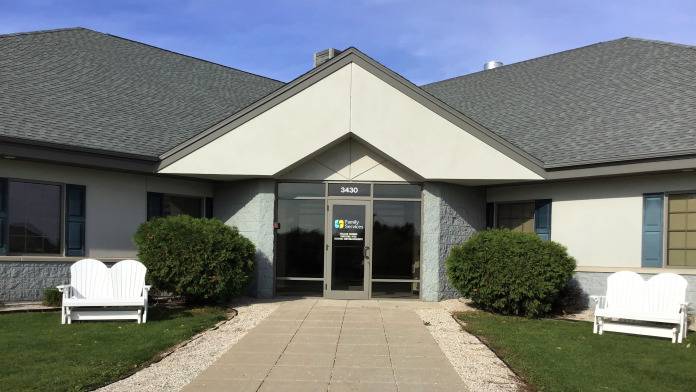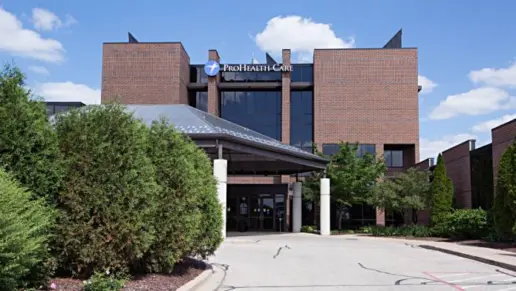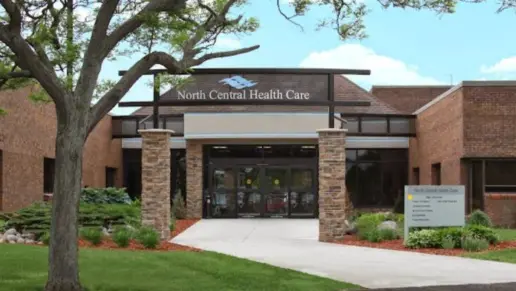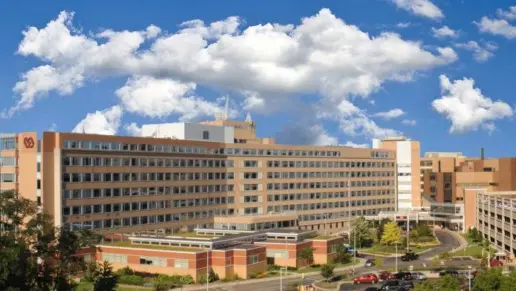About Family Services – Billie Kress Center
For young people struggling with severe mental, emotional and behavioral issues, Family Services - Billie Kress Center offers an intensive live in treatment program in Green Bay, Wisconsin. The program serves youth ages 10 to 17. There are two double rooms and 18 private rooms in this establishment. Every child’s room has a separate bathroom. In addition, there are two classrooms, two cozy rooms for group and family counseling, a sensory room and a fully equipped kitchen with a dining area. Both indoor and outdoor leisure spaces are also available on the premises.
For young people struggling with severe mental, emotional and behavioral issues, Family Services – Billie Kress Center offers an intensive live in treatment program in Green Bay, Wisconsin. The program serves youth ages 10 to 17. There are two double rooms and 18 private rooms in this establishment. Every child’s room has a separate bathroom. In addition, there are two classrooms, two cozy rooms for group and family counseling, a sensory room and a fully equipped kitchen with a dining area. Both indoor and outdoor leisure spaces are also available on the premises.
Their close knit and extensive staffing arrangements guarantee a secure and comfortable atmosphere for kids. They approach providing treatment services in a trauma informed and individualized manner. In addition to working with families and referral sources to create individualized care plans, their skilled multidisciplinary staff conducts thorough needs based assessments. This process occurs within the first 30 days of admission and lays the foundation for the course of treatment.
They offer a variety of evidenced based therapeutic services. Along with individual and family therapy services, they also include cognitive behavioral therapy, trauma therapy and independent living skills development. They also offer individual and group dialectical behavior therapy and AODA therapy.
They have permission to cater to a maximum of 22 minors who can be either male or female. They assist kids with various diagnoses as well as issues related to alcohol and other drug abuse. They can also serve a type 2 correctional order for minors.
Their effectiveness is evaluated by how quickly and smoothly they are able to reintegrate children into a less restrictive environment. Even with the most difficult children they have established a reputation for success. Over 90% of the children they assist are able to reintegrate successfully into their home, schools and other community settings.
Facility Overview
Rehab Score
Gallery

Location
Accepted Insurance
Other Forms of Payment
Medicaid is a state based program that helps lower-income individuals and families pay for healthcare. Medicaid covers addiction treatment so those enrolled can use their coverage to pay for rehab. When a program accepts Medicaid the client often pays very little or nothing out of their own pocket.
Private insurance refers to any kind of healthcare coverage that isn't from the state or federal government. This includes individual and family plans offered by an employer or purchased from the Insurance Marketplace. Every plan will have different requirements and out of pocket costs so be sure to get the full details before you start treatment.
Self-pay involves paying for treatment out of your own pocket. You can use savings or credit, get a personal loan, or receive help from family and friends to fund your treatment. If you don't have insurance or your insurance plan doesn't cover a specific program, self-pay can help ensure you still get the care you need.
Medicare is a federal program that provides health insurance for those 65 and older. It also serves people under 65 with chronic and disabling health challenges. To use Medicare for addiction treatment you need to find a program that accepts Medicare and is in network with your plan. Out of pocket costs and preauthorization requirements vary, so always check with your provider.
Addiction Treatments
Levels of Care
Treatments
Many of those suffering from addiction also suffer from mental or emotional illnesses like schizophrenia, bipolar disorder, depression, or anxiety disorders. Rehab and other substance abuse facilities treating those with a dual diagnosis or co-occurring disorder administer psychiatric treatment to address the person's mental health issue in addition to drug and alcohol rehabilitation.
Mental health rehabs focus on helping individuals recover from mental illnesses like bipolar disorder, clinical depression, anxiety disorders, schizophrenia, and more. Mental health professionals at these facilities are trained to understand and treat mental health issues, both in individual and group settings.
Clinical Services
Cognitive Behavioral Therapy (CBT) is a therapy modality that focuses on the relationship between one's thoughts, feelings, and behaviors. It is used to establish and allow for healthy responses to thoughts and feelings (instead of unhealthy responses, like using drugs or alcohol). CBT has been proven effective for recovering addicts of all kinds, and is used to strengthen a patient's own self-awareness and ability to self-regulate. CBT allows individuals to monitor their own emotional state, become more adept at communicating with others, and manage stress without needing to engage in substance abuse.
Whether a marriage or other committed relationship, an intimate partnership is one of the most important aspects of a person's life. Drug and alcohol addiction affects both members of a couple in deep and meaningful ways, as does rehab and recovery. Couples therapy and other couples-focused treatment programs are significant parts of exploring triggers of addiction, as well as learning how to build healthy patterns to support ongoing sobriety.
Dialectical Behavior Therapy (DBT) is a modified form of Cognitive Behavioral Therapy (CBT), a treatment designed to help people understand and ultimately affect the relationship between their thoughts, feelings, and behaviors. DBT is often used for individuals who struggle with self-harm behaviors, such as self-mutilation (cutting) and suicidal thoughts, urges, or attempts. It has been proven clinically effective for those who struggle with out-of-control emotions and mental health illnesses like Borderline Personality Disorder.
Research clearly demonstrates that recovery is far more successful and sustainable when loved ones like family members participate in rehab and substance abuse treatment. Genetic factors may be at play when it comes to drug and alcohol addiction, as well as mental health issues. Family dynamics often play a critical role in addiction triggers, and if properly educated, family members can be a strong source of support when it comes to rehabilitation.
Group therapy is any therapeutic work that happens in a group (not one-on-one). There are a number of different group therapy modalities, including support groups, experiential therapy, psycho-education, and more. Group therapy involves treatment as well as processing interaction between group members.
In individual therapy, a patient meets one-on-one with a trained psychologist or counselor. Therapy is a pivotal part of effective substance abuse treatment, as it often covers root causes of addiction, including challenges faced by the patient in their social, family, and work/school life.
Trauma therapy addresses traumatic incidents from a client's past that are likely affecting their present-day experience. Trauma is often one of the primary triggers and potential causes of addiction, and can stem from child sexual abuse, domestic violence, having a parent with a mental illness, losing one or both parents at a young age, teenage or adult sexual assault, or any number of other factors. The purpose of trauma therapy is to allow a patient to process trauma and move through and past it, with the help of trained and compassionate mental health professionals.
Staff

President and CEO

CFO

VP-Human Resources

VP– Programs & Strategy

VP– Philanthropy & Communication

VP– Programs & Strategy
Contact Information
3430 Spirit Way
Green Bay, WI 54304







